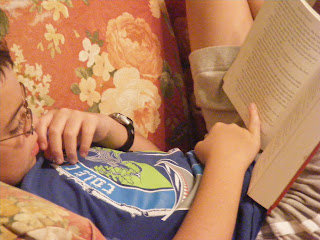Hilary Rosen. God bless her. God bless all the people who use words for a living. They are bound to misspeak.
Margaret Thatcher, on a whirlwind tour of European nations, gave a speech and said something like, "I'm so honored to be visiting Bulgary (or maybe it was Hungaria?)." Ouch. Dan Quayle once wowed elementary students with his spelling of potato. But his funniest gaffe? Commenting on a natural disaster, he said, "The loss of life will be irreplaceable."
I laughed until I cried over that one.
Politicians, Talking Heads, Wordsmiths -- they use words and lots of them. They are bound to blunder. So Hilary Rosen famously said, "Ann Romney has never worked a day in her life," and thereby ignited a firestorm and gave pundits and bloggers of America fodder for the month.
As for me, I read her words and literally did LOL.
See, I've worked a few days in my life. I've delivered newspapers. I've washed windows full time. I've been a nanny and a maid. I've waited tables and served as a restaurant hostess. I've scooped ice cream. I've taught little girls how to ride horses. I've been a camp counsellor, many times over. I was a candy striper for about four hours and a cocktail waitress for one night. I squeezed oranges and went table to table selling the juice. True story. I think I earned seventeen cents a glass. I've been a logistics manager and an English teacher. I've served as an Army captain, and I've manned the drive-thru at Burger King.
As I've shared before, the toughest and most rewarding job of all is caring for these four cherubs who call me Mom or MOOOOOOOM! (as the case more often is).

On a morning I should have spent tackling an editing job that's due tomorrow or hacking away at the mound of paperwork shamelessly breeding to my left or having a tea party with two-year-old Ainsley, I instead wrapped my brain around the article Dartmouth undergraduate Clare Coffey posts at
Everything's Coming Up Rosen and Sally Thomas' response over at
Mother, Self, and Sacrifice.
Coffey describes "The Cult of Motherhood" that rests, she says, on the idea of victimhood. She writes:
I see women at the playground who look like zombies–completely exhausted, frazzled by the demands of their children, clad in dirty and ill-fitting clothing, constantly interrupted in what may be their only adult interactions till the Mr. gets home by the requests and complaints of their children. “Men just don’t understand,” they say. “It’s all part of being a mom."
She goes on to say:
 Contrary to the sacrificial lamb aspect of the motherhood mythos, it is perfectly acceptable to say “We need to make buying clothes for me a priority in our budget, because I am a human being and a worker, and both of those facts demand a certain dignity.” It is perfectly acceptable to say “No, you’re not doing trombone camp this year, because I have interests and talents that do not involve you, and spending my life in the car prevents me from pursuing them.” It is perfectly acceptable to say “No, I will not stay up late making rice-krispie treats in the shape of ninja turtles, because who does that?” Thanks for nothing, Pinterest.
Contrary to the sacrificial lamb aspect of the motherhood mythos, it is perfectly acceptable to say “We need to make buying clothes for me a priority in our budget, because I am a human being and a worker, and both of those facts demand a certain dignity.” It is perfectly acceptable to say “No, you’re not doing trombone camp this year, because I have interests and talents that do not involve you, and spending my life in the car prevents me from pursuing them.” It is perfectly acceptable to say “No, I will not stay up late making rice-krispie treats in the shape of ninja turtles, because who does that?” Thanks for nothing, Pinterest.
From the start Coffey says, "I don’t know squat from motherhood." Some readers have scoffed at Ms.Coffey -- single, no children -- for tackling the subject at all. I beg to differ. Here you have an articulate young woman pondering, as she says, "the Big Questions" and getting herself published to boot. Bully for her, I say. Young people should be examining these issues if only to avoid limiting their options later in life.
(Naturally I get nervous when a writer criticizes mothers in "dirty and ill-fitting clothes," but as long as she doesn't move on to the mother with the wet hair pulled back in a pony tail with the sunglasses on top, I guess we're in safe territory.)
Clare raises valid points. The issue of mother as victim is worth examining, and it leads to another issue -- the child as god.
If I have a passion, it is that women, mothers, and families need support. That's one reason why I'm part of the Alleluia Community (click
here to read a little more). It's one of the reasons I write this blog and throw perhaps a little more than I should out there for other mothers to read. It's why I read and support
Faith and Family Live!, a great source of encouragement, advice, and humor.
The family is the most basic unit of society. Begin to fix the family, and you'll begin to fix half the problems our nation faces. At the heart of family is the mother, and we need to take care of her. All mothers -- stay-at-home mothers, working mothers, single mothers, divorced mothers, sick mothers, young mothers -- need the support and friendship of other women. Babies, small children -- their needs are more obvious and usually more urgent. Of course we put them first. But, in a metaphor that falls short and is sure to irk many, if you kill the cow, you kill the calf.
I've heard of priests who counsel mothers, "Forget about penance. Being a mother is all the penance you need." Self-sacrifice is built into the job whether you want it or not. A while back I wrote
Why Not Take All of Me in response to a mother's attempt to calculate with the precision of an accountant just how much she was willing to sacrifice for her children.
I sat with a priest one morning getting spiritual direction and confessing my sins, most of which had to do with my failures as a mother.
"Isn't it great," the priest consoled me, "that you have so many opportunities for holiness?"
Yes, Father, but by 8:30 in the morning?
It is constant; it is intense; it requires eradication of selfishness.
But let's examine Clare's issue of victimization. Sally Thomas, picking up this theme, describes "the way the parents seemed to wear their nose-wiping and their constant family
diet of chicken nuggets as badges of honor." Woe is me, these ill-clad mothers cry, wearing their sufferings on their snot-laden sleeves. Tribulations become some sort of competition: I'll see your conjunctivitis and raise you one case of strep throat and a bout of rota virus.
Sally writes:
 I used to laugh at the comic strip "Baby Blues," for example (and okay, in
small doses it's still kind of funny), until I realized that virtually every
story line revolves around the shambles the children make of their parents'
lives. It's all chaos and vomit and Mom wearing ketchup stains and baby spit-up,
and while I've been there, and I know that those things are reality in a house
with young children, still as a meme it gets old.
I used to laugh at the comic strip "Baby Blues," for example (and okay, in
small doses it's still kind of funny), until I realized that virtually every
story line revolves around the shambles the children make of their parents'
lives. It's all chaos and vomit and Mom wearing ketchup stains and baby spit-up,
and while I've been there, and I know that those things are reality in a house
with young children, still as a meme it gets old.
Agreed. It is reality, and it does get old. And to a child-free college student like Clare Coffey, I would imagine chaos and vomit and spit-up presented as the sum total of motherhood would be very, very unappealing.
While fully recognizing the hard work and, yes, drudgery that parenting entails, Sally differentiates between this and what she calls "self-negation" or "self-erasure." Whittling away at selfishness is one thing; destroying self is quite another.
When victimization isn't just venting with your mom friends in the backyard or penning a cathartic blog post full of poop, you end up in a much darker place. There you find chronic resentment. There you find long term depression. There you find neglect and abuse. And let's face the stark truth: Once in a great, great while you find an Andrea Yates.

Kill the cow and you kill the calf.
When a mother moves beyond self-sacrifice to self-erasure, she runs the risk of destroying herself, and she sends a destructive message to her child: You are a god.
Let me just say right here that to a large degree my life revolves around my kids. There are four of them and one of me. Their needs are many and will be for years to come.
As Sally Thomas writes:
Human motherhood does demand sacrifice; in fact, I think that's sort of the
chief purpose for it. That's what's in it for the mother, at any rate. In
following Jesus, we have to learn somehow to detach ourselves from ourselves,
and I can't think of too many better ways to do that than to carry another human
being in our own body, to suffer to bring that human being to birth, and to
serve the flourishing of that life. In our children's flourishing, we find a lot
of our own flourishing, and we wouldn't find it if we weren't continually laying
down our lives in love for these nearest of our neighbors and friends.
But the key to meeting needs without enabling neediness is balance. Sally continues:
 A lot of us, myself included, do say things to our kids like, "Not now," and "Run along while I finish what I'm working on," and "You can do X when I'm done with Y," and so on. Which is to say that don't have to be a sociopathic narcissist to a) have projects of your own, or b) intimate to your children that that is the case, and that the absoluteness of your ability to them depends on what you happen to be doing, which may or may not have anything to do with them and their desires at that moment.
A lot of us, myself included, do say things to our kids like, "Not now," and "Run along while I finish what I'm working on," and "You can do X when I'm done with Y," and so on. Which is to say that don't have to be a sociopathic narcissist to a) have projects of your own, or b) intimate to your children that that is the case, and that the absoluteness of your ability to them depends on what you happen to be doing, which may or may not have anything to do with them and their desires at that moment.
Amen.
Self-sufficient is what they should be at the end of the day, having been raised by warm, supportive, involved parents who have met their needs and plenty of their wants.
I don't want to be erased. I don't want to raise narcissistic gods. I don't want to become a narcisisstic god myself.
Thankfully, we are fully able to select "none of the above" when presented with these rather bleak options, and I wholeheartedly agree with Sally's assertion that, "In our children's flourishing, we find a lot of our own flourishing."















































